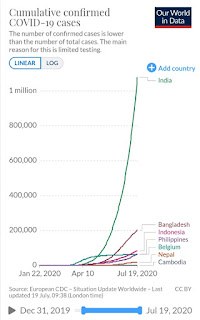The COVID-19 pandemic has passed 13 million, killing over 570.000 people worldwide. Every day, the number of new cases set another daily record. Many health experts say the actual number of cases around the world may be much more than the reported numbers. Vaccines can take at least a year to develop before they are proved to be safe and effective. The pandemic is taking a huge toll on health, economy and social life around the world.
Epidemiological characteristic of COVID-19 showed that virus infections tend to be more severe for older peoples and those with pre-existing health conditions, which unfortunately occur more frequently in disadvantaged groups, groups of people who have less or no access to health care, or more likely to live and work in conditions that increase the risk of infection. The policies to contain it could even widen pre-existing inequalities.
Countries have adopted various forms of policies and measures to “flatten the curve”, including a range of public health and social measures, movement restrictions, closure of schools and businesses, restriction on social-religious-sports-entertainment activities, quarantine in specific geographic areas and international travel restrictions. With school closures in over 190 countries, children’s education -especially for the girls- is at risk and potentially increases child labour. As education and training have been disrupted, young people have greater obstacles for their transition from school to work, their start-up business have seen collapses, and a current wave of job losses have hampered employment opportunities and earning, forcing more than one in six people aged under 29 to stop working. Anxiety or depression among young generation led many to dub them the ‘lock down generation’.

